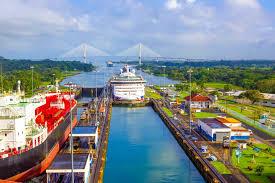
Canal Will Restrict Daily Transits To 24 At Least Until April
The Panama Canal will maintain, at least until April, restrictions on the passage of ships through its locks, an operation governed by the weather, the amount of rain that falls, its storage and the rationed use of the resource.
In an interview with The Associated Press, Ricaurte Vásquez, administrator of the Canal, said that the restriction of 24 daily transits will remain in place until at least April of this year, compared to the 36 or 38 that usually cross the locks in normal times.
Vásquez told the news agency that they could increase the transit of more ships if weather conditions allow it, especially with more rain but normalization is unlikely before 2025.
In January, Vásquez, , explained the implications of the drought and the proposal for a reservoir on the Indio River that depends on the decision of the Executive. Isaac Ortega
The Panama Authority monitors the level of the Gatún and Alajuela lakes, in addition to water precipitation, so it can be confirmed with greater precision if there will be any change in the schedule between March 15 and 20, when the weather forecast is made for the next 45 days. 13, Lake Alajuela had a level of 244.56 feet, when its operating maximum is 252 feet.
El Gatún, meanwhile, was at 81.04 feet and its maximum level is 87.50 feet.
Although neither of the two reservoirs is at its optimal levels, they do not show greater depression, due to the water-saving measures, considering the drought of 2023 and foreseeing very dry days in the current summer of 2024.
In addition to the restriction on the number of daily transits, the main actions include the implementation of the use of water-saving tanks in the Neopanamax locks.
Other measures include the suspension of special transits and hydraulic assistance,
Therefore, the Canal has revealed that the deficit of 661 mm3 has been the driest recorded in the period from 1951 to 2023.
The lack of water is critical for a route that moves 5% of world trade. In the country, there is uncontrolled water consumption among the population and at the same time there is a lack of rain and a late execution of a water plan for the Canal.
The ACP observes the water reservoir in the Indio River as the most viable project, but for this to materialize, the executive needs to promote legal changes. On the one hand, to lift the restriction on building reservoirs in the country, and on the other hand, to expand the limits of the canal basin.
Four months before the end of Laurentino Cortizo's administration, there were no movements regarding legislative reforms.

Legal Disclaimer:
MENAFN provides the
information “as is” without warranty of any kind. We do not accept
any responsibility or liability for the accuracy, content, images,
videos, licenses, completeness, legality, or reliability of the information
contained in this article. If you have any complaints or copyright
issues related to this article, kindly contact the provider above.

















Comments
No comment